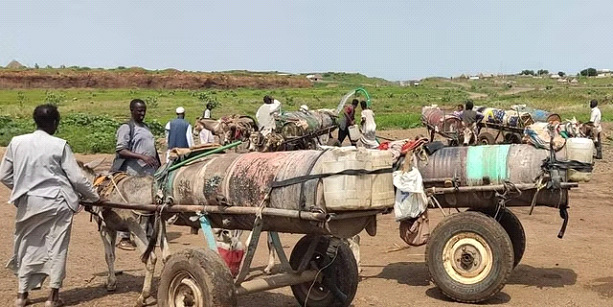WAD MADANI (TIP): Fighting between two rival generals has spread to cities in war-ravaged Sudan’s south, witnesses said on August 18, raising concerns for hundreds of thousands who have fled violence in the Darfur region. The vast western region has seen some of the worst bloodshed since the conflict erupted on April 15 between the army under General Abdel Fattah al-Burhan and the paramilitary Rapid Support Forces (RSF) commanded by Mohamed Hamdan Daglo.
Battles resumed late Thursday in the North Darfur state capital of El Fasher, witnesses said, disrupting nearly two months of calm in the densely populated city that has become a shelter from the shelling, looting, rapes and summary executions reported in other parts of Darfur.
“This is the biggest gathering of civilians displaced in Darfur, with 600,000 people in El Fasher,” said Nathaniel Raymond of the Humanitarian Research Lab at the Yale School of Public Health.
One resident told AFP: “As night fell, we heard battles with heavy weapons from the city’s east.”
Witnesses also reported fighting in Al-Fulah, the capital of West Kordofan state which borders Darfur.
The conflict had already expanded to North Kordofan state, a commercial and transport hub between Khartoum and parts of southern and western Sudan.
‘Indiscriminate shelling’
Human rights groups and witnesses who fled Darfur have reported the massacre of civilians and ethnically driven attacks and killings, largely by paramilitary forces and their allied Arab tribal militias.
Many have fled across the western border to neighbouring Chad, while others have sought refuge in other parts of Darfur, where the International Criminal Court is probing alleged war crimes.
The region has been the focus of deadly fighting since 2003 when the then government in Khartoum unleashed the feared Janjaweed — precursors of the RSF — on ethnic minority rebels and civilians suspected of supporting them.
On Friday, an armed group that in 2020 signed a peace agreement with Khartoum announced it was aligning with the RSF.
The so-called Tamazuj Front said it aimed “to fight the remnants of the old regime that use the army to reinstate their totalitarian power”.
Several figures of former strongman Omar al-Bashir’s regime, which was toppled in 2019, have escaped from prison in recent months, with some voicing their support for the army.
Fighting in the latest conflict has concentrated on El Geneina, the capital of West Darfur state, where the UN suspects crimes against humanity have been committed.
Nyala, Sudan’s second city and capital of South Darfur state, has been in the throes of recent fighting.
An emergency room set up in the city said Friday that it had been “living under catastrophic humanitarian conditions” as fighting raged for a seventh straight day.
“The clashes have resulted in the death of a large number of defenceless victims… and a countless number of injuries and humanitarian violations with all state hospitals out of service,” it added.
The United States on Thursday urged the warring sides “to cease renewed fighting in Nyala… and other populated areas”.
“We are particularly alarmed by reports of indiscriminate shelling carried out by both” parties, State Department spokesman Matthew Miller said.
‘Chaos’
Further east, a resident of Al-Fulah said “the RSF are confronting the army and the police, and public buildings have been set on fire during their fire exchanges”.
“Shops were looted and there are dead on both sides, but no one can get to the bodies in this chaos,” said another witness in Al-Fulah.
The conflict has killed at least 3,900 people nationwide, according to a conservative estimate by the Armed Conflict Location & Event Data Project.
The actual toll is believed to be much higher, as the fighting restricts access to many areas.
UN experts voiced particular concern for women and girls caught up in the conflict, denouncing “rape and sexual violence” by RSF fighters.
“Men identified as members of the RSF are using rape and sexual violence of women and girls as tools to punish and terrorise communities,” the independent experts said Thursday, citing survivors.
In neighbouring South Sudan, medical charity Doctors Without Borders (MSF) said more than 200,000 people, mostly women and children, had arrived from Sudan since the fighting erupted.
Many of them were “exhausted and extremely vulnerable” and require urgent aid, MSF said. (AFP)
Fears for hundreds of thousands as Sudan war spreads
